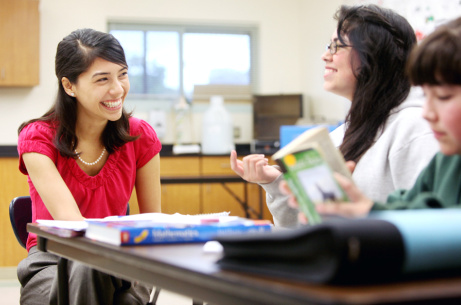
Scholar-Elect Sarah Mummah has been working on how to change behaviour around eating.
Sarah Mummah was just an undergraduate when she set up her own non-profit tutoring and mentoring organisation and has built it up into an award-winning project with a team of over 30 undergraduates at its command.
DreamCatchers aims to tackle the academic resources gap faced by poorer children in the Palo Alto area of California. It is now launching a healthy behaviours programme which she hopes to evaluate through her research.
Both the mentoring and healthy eating issues are personal ones for Sarah, and that personal experience helps drive all her work.
Born in Redwood City, California, Sarah’s family background has helped propel her academic interests.
Her mother, originally born in El Salvador, immigrated to the US when she was five and became the first person in her family to go to college. Years later when Sarah was four, her mother went to medical school across the country in New York while her great grandmother moved in with her and her father to help raise her.
Sarah’s parents split up when she was 13 and she says she became very independent as a result. “I had to grow up very quickly,” she says. “It served me well later down the line.”
However, in high school she developed anorexia and her weight fell to just 90 pounds. “I was exhausted all the time. One of my best friends was hospitalised with the disorder. For me it was a cry for help,” she says.
Her friends helped her to recover, but the recovery process sparked her interest in healthy eating and in taking care of her body, and she started to read all about it.
By extension, she started worrying about her mother’s and great grandmother’s health. Her great grandmother had diabetes. “I watched what poor health can do to a person, especially in old age,” she says. She realised that healthy eating was about changing behaviour, something which was much more complicated than just telling someone to eat good food. “It’s not just about rational decision making,” she says. “I tried to change both my mother’s and great grandmother’s behaviour, but realised I could not do so just through persuasion.”
Sarah’s parents had always placed a big emphasis on education and paid for her to go to private elementary and high schools. She grew up with a desire to repay that investment and justify their hard work by giving something back to the community. That desire to learn and give back led her to Stanford and to volunteering for a healthy eating group which aimed to teach children about better nutrition and exercise to help them build healthier behaviour.
She would ask the children if they had a family member with diabetes, talk to them about the importance of eating well, and try to grab their attention by showing images of clogged arteries, but she found the experience frustrating. “I thought I had their attention, but after leaving the classes they would flock to the ice cream truck. I realised that we needed to do a lot more to stop these children from ending up with diabetes in 30 or 40 years.”
Early on, she thought she would follow in her mother’s footsteps and become a doctor. But as she majored in human biology at Stanford, she became more and more interested in public health and healthcare policy. “My interest was in broader societal issues,” she says. “The more I learned, the more it seemed far more effective to tackle issues like obesity at a community level rather than on an individual basis like you would as a doctor.”
Her degree focused on addressing inequities in health and education through social interventions. She did extra-curricular work to support her academic work. In the summer of 2007, for instance, she delivered healthcare and health education to underserved communities in Guatemala and Honduras, her interest in health issues in Latin America being in part sparked by a visit to El Salvador with her mother.
After her sophomore year at Stanford Sarah was accepted for a summer job at an organisation which provides affordable housing. She came across lots of children who, due to poor access to educational resources, were struggling in school compared to those from wealthier backgrounds.
She decided to make use of the resources at her university and in 2008 founded and led DreamCatchers, a non-profit tutoring and mentoring programme serving low-income middle school students in Palo Alto. “It was a very steep learning curve,” she says. Over the last four years, she has led the organisation’s growth to 45+ students across two sites, developed a multi-year partnership with the YMCA of Silicon Valley and received several local awards for her work, including a Community Star Award from the Mayor of Palo Alto.
Sarah graduated from Stanford in 2010 and won a Fulbright grant to do public health research in Oaxaca, Mexico, on health-education interventions, “stealth” interventions and their effectiveness in motivating health behaviour change. Her work culminated in the publication of an opinion piece in a Oaxacan newspaper, Noticias Voz e Imagen de Oaxaca.
She has been DreamCatchers’ executive director for the past four years, working full time since September.
While she is at Cambridge doing an MPhil in public health, someone will be stepping into her role.
She hopes her work will deepen her understanding of how best to improve health behaviours and outcomes and help her to create interventions that effectively prevent obesity and chronic illnesses.
Picture credit: Michelle Le/The Almanac












